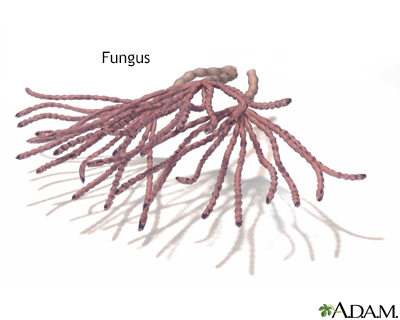Pregnancy SmartSiteTM
C. neoformans var. neoformans infection; C. neoformans var. gatti infection; C. neoformans var. grubii infection DefinitionCryptococcosis is infection with the fungi Cryptococcus neoformans or Cryptococcus gattii. CausesC neoformans and C gattii are the fungi that cause this disease. Infection with C neoformans is seen worldwide. Infection with C gattii has mainly been seen in the Pacific Northwest region of the United States, British Columbia in Canada, Southeast Asia, and Australia. In the United States, sporadic cases have been seen in many states including Washington, Oregon, California, Idaho, Hawaii, Georgia, Rhode Island, and Florida. Cryptococcus is the most common fungus that causes serious infection worldwide. Both types of fungi are found in soil. If you breathe the fungus in, it can infect your lungs. The infection may go away on its own, remain in the lungs only, or spread throughout the body (disseminate). C neoformans infection is most often seen in people with a weak immune system, such as those who:
C gattii may affect people with normal immune system (not immunocompromised). C neoformans is the most common life-threatening cause of fungal infection in people with HIV/AIDS. People between 20 to 40 years of age are the most common age group that has this infection. SymptomsThe infection may spread to the brain in people who have a weakened immune system. Neurological (brain) symptoms start slowly. Most people have swelling and irritation of the brain and spinal cord when they are diagnosed. Symptoms of brain infection may include:
The infection can also affect the lungs and other organs. Lung symptoms may include:
Other symptoms may include:
People with a healthy immune system may have no symptoms at all. Exams and TestsYour health care provider will perform a physical exam and ask about symptoms and travel history. The physical exam may reveal:
Tests that may be done include:
TreatmentAntifungal medicines are prescribed for people infected with Cryptococcus. Medicines include:
Outlook (Prognosis)Central nervous system involvement often causes death or leads to permanent damage. When to Contact a Medical ProfessionalContact your provider if you develop symptoms of cryptococcosis, especially if you have a weakened immune system. ReferencesChen SC-A. Cryptococcosis. In: Goldman L, Cooney KA, eds. Goldman-Cecil Medicine. 27th ed. Philadelphia, PA: Elsevier; 2024:chap 309. Perfect JR. Cryptococcosis (Cryptococcus neoformans and Cryptococcus gattii). In: Bennett JE, Dolin R, Blaser MJ, eds. Mandell, Douglas, and Bennett's Principles and Practice of Infectious Diseases. 9th ed. Philadelphia, PA: Elsevier; 2020:chap 262. Robles WS, Ameen M. Cryptococcosis. In: Lebwohl MG, Heymann WR, Murrell DF, eds. Treatment of Skin Disease: Comprehensive Therapeutic Strategies. 6th ed. Philadelphia, PA: Elsevier; 2022:chap 49. | |
| |
Review Date: 8/29/2024 Reviewed By: Jatin M. Vyas, MD, PhD, Roy and Diana Vagelos Professor in Medicine, Columbia University Vagelos College of Physicians and Surgeons, Division of Infectious Diseases, Department of Medicine, New York, NY. Also reviewed by David C. Dugdale, MD, Medical Director, Brenda Conaway, Editorial Director, and the A.D.A.M. Editorial team. The information provided herein should not be used during any medical emergency or for the diagnosis or treatment of any medical condition. A licensed medical professional should be consulted for diagnosis and treatment of any and all medical conditions. Links to other sites are provided for information only -- they do not constitute endorsements of those other sites. No warranty of any kind, either expressed or implied, is made as to the accuracy, reliability, timeliness, or correctness of any translations made by a third-party service of the information provided herein into any other language. © 1997- A.D.A.M., a business unit of Ebix, Inc. Any duplication or distribution of the information contained herein is strictly prohibited. | |

 Cryptococcus - cut...
Cryptococcus - cut... Cryptococcosis on ...
Cryptococcosis on ... Fungus
Fungus
